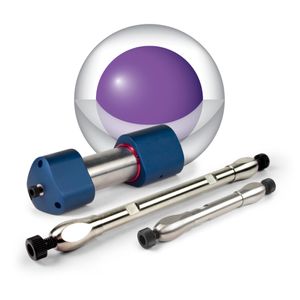WEBINARS
Our webinars allow users to learn from experts and earn continuing education credits on industry topics, progress in research, services available, and more.
Show More
-
MAR 19, 2024 | 10:00 AMC.E. CREDITSLaboratories use the same laboratory equipment they invested in for COVID testing to perform PGx testing. With COVID testing reimbursement dropping, many laboratorians are considering implem...
-
MAR 14, 2024 | 3:00 PMC.E. CREDITSThe practice of diagnostic pathology has gone through a disruptive transformation in which multiple tools such as digital imaging, advanced artificial intelligence algorithms, and computer-a...
-
MAR 06, 2024 | 1:00 PMC.E. CREDITSLaboratories are required to participate in proficiency testing (PT). PT is a powerful tool for laboratories to learn about their own testing performance and discover potential issues with t...
-
On DemandC.E. CREDITSSpeech neuroprostheses have the potential to restore communication to people living with paralysis, but naturalistic speed and expressivity are elusive. Here we use high-density surface reco...
-
On DemandC.E. CREDITSDBS for obsessive-compulsive disorder (OCD) achieves clinical benefit in 66% of treatment-resistant patients. However, there is still a lack of a fundamental understanding of the neurophysio...
-
FEB 29, 2024 | 3:00 PMC.E. CREDITSIn recent years, small volume biopsies have been increasingly utilized for diagnosis of tumors in both primary and recurrent settings. Concomitantly, the numbers of ancillary studies for cha...
-
FEB 14, 2024 | 10:00 AMC.E. CREDITSWomen experience a variety of unique sexual health issues that are often under appreciated by the general public and even by healthcare providers. Compared to other populations, cisgender wo...
-
FEB 14, 2024 | 9:00 AMC.E. CREDITSLearning Objectives Identify three ways automation improves cryosectioning techniques Demonstrate three essential elements to obtaining reproducible, high-quality sections with cryosectionin...
-
DEC 14, 2023 | 10:00 AMC.E. CREDITSOver the course of the COVID-19 pandemic, there has been a dramatic increase in the number and type of diagnostic tests for respiratory viruses. These include targeted molecular assays, smal...
-
DEC 07, 2023 | 10:00 AMC.E. CREDITSLateral flow assay applications have become increasingly diverse in a post-pandemic world, and the areas of infectious disease and oncology continue to be at the forefront. In both areas, th...
-
DEC 01, 2023 | 6:00 AMC.E. CREDITSIn recognition of World AIDS Day, we invite you to discover the innovative work being done to help end the HIV epidemic in some of the hardest hit areas in India. A diagnosis is the first st...
-
NOV 30, 2023 | 12:00 PMC.E. CREDITSPathology Perspective: Discover the critical need for genomic testing in cancer and explore the differences between traditional tissue biopsies and liquid genomic profiling. We'll dive i...
-
NOV 16, 2023 | 8:00 AMC.E. CREDITSMyelodysplastic Syndrome (MDS) requires a complicated workup that can be supported by Artificial Intelligence (AI). Initial findings using AI have shown that MDS can be preliminarily identif...
-
NOV 15, 2023 1:00 PM ETC.E. CREDITSSummary: Internal quality control is an integral process of laboratory testing. A clinical laboratory's coagulation quality control (QC) program is a critical component of its quality as...
-
NOV 14, 2023 | 10:00 AMC.E. CREDITSAssessment for anti-dsDNA antibodies provides some of the most significant challenges in autoantibody serology testing. Anti-dsDNA antibodies are an important biomarker for systemic lupus er...
-
NOV 14, 2023 | 6:00 AMC.E. CREDITSIt is over half a century since haemoglobin A1c (HbA1c) was recognised by medical professionals; the importance of HbA1c to the long term health of people with diabetes was clearly demonstra...
-
NOV 09, 2023 | 8:00 AMC.E. CREDITSTissue microarray combines tens to hundreds paraffin-embedded specimens into a single paraffin block. It is a practical and highly effective tool for high-throughput analyses including valid...
-
NOV 08, 2023 | 9:00 AMC.E. CREDITSAccess to and experiences with healthcare continue to be inequitable worldwide even at the level of clinical laboratory testing. From building and sustaining a thriving, diverse workforce to...
-
On DemandC.E. CREDITSImmunoassays and mass spectrometric assays are the two major methodologies in contemporary clinical chemistry laboratories. While immunoassays are highly automated and offer a faster turnaro...
-
On DemandC.E. CREDITSDespite an overall good performance on all laboratory procedures used to detect monoclonal (M) proteins or paraproteins, mis- or false-diagnoses have been seen using electrophoresis methods,...
-
On DemandThis talk will describe the role of the clinical lab in advancing health equity. It will define the gaps in equitable access to lab testing and how that impacts patient care. We will also co...
-
On DemandC.E. CREDITSMedical laboratories are an integral part of the healthcare system. They supply crucial diagnostic data that underpins disease detection, patient care, and public health management....
-
On DemandC.E. CREDITSTraumatic brain injury (TBI) is a widespread global health concern, impacting approximately 10 million individuals annually. Beyond the initial acute phase, TBI often results in enduring neu...
-
On DemandC.E. CREDITSInterference in laboratory assays is a concern since it can positively or negatively influence test results, which can affect patient care. Interferents could be endogenous or exogenous comp...
-
NOV 01, 2023 | 9:00 AMThis talk will provide an overview of our work in the design of self-assembled, functionalised peptide and protein nanoparticles, hydrogels and bio-interfaces for applications in healthcare....
-
NOV 01, 2023 | 7:30 AMCoronavirus Disease 2019 (COVID-19) has driven the use of nucleic acid testing technology in clinical testing. There is a growing need for point-of-care testing (POCT)......
-
On DemandType V and VI CRISPR/Cas systems have emerged as promising cutting-edge diagnostic tools for nucleic acid detection....
































































